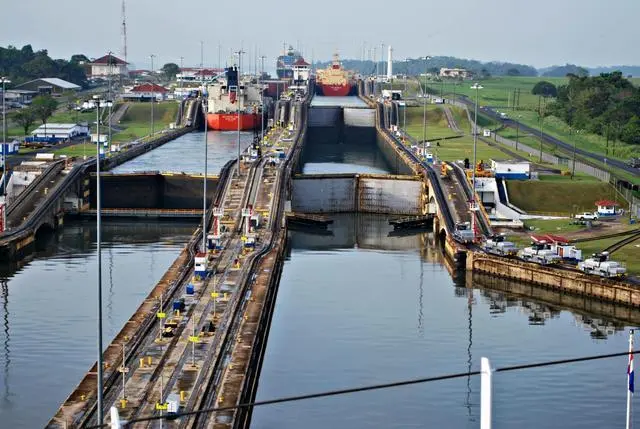30 million at a time! Panama Canal ship "queue-cutting fee" reached a new high
 2023-11-15
2023-11-15
 446
446
The Panama Canal is suffering from a continuous drought, and its impact on global trade is escalating. According to the data of Panama Canal Authority, as of the 13th local time, there are about 126 cargo ships waiting to pass near the entrance of Panama Canal, and the longest queue time may reach 12 days. The latest auction price of the first passage right of ships, that is, the "queue-cutting fee", has set a record of nearly 4 million US dollars (about 29.17 million yuan), which has greatly raised the transportation cost in Transit.


Panama Canal, with a total length of 81.3 kilometers, connects the Atlantic Ocean and the Pacific Ocean, and is the golden waterway of global trade. Panama Canal is as famous as Suez Canal, which plays a vital role in world trade and economic development.
According to the data of Panama Canal Authority, Panama Canal currently provides about 180 sea routes, which can connect about 170 countries and regions and reach about 1920 ports around the world. According to the data of the US Department of Commerce, Panama Canal is the "artery" of shipping trade between Asia and the United States, and the volume transported through the canal accounts for 46% of the total market share from Northeast Asia to Container on the east coast of the United States. About 6% of the world's maritime trade, mainly from the United States, China and Japan, depends on this waterway.
The United States is the largest user of the Panama Canal, and the total amount of goods exported and imported into Container accounts for about 73.7% of the transportation volume of the Panama Canal. Every year, 40% of the Container in the United States is transported through canals, and the value of goods is about $270 billion.
China is the second largest user of Panama Canal, and its freight volume accounted for 21.4% of the total freight volume of the canal in fiscal year 2022.
Panama is a sluice canal. It is necessary to use sluices to raise or lower the water level, so that ships can pass through the river between the central mountains of Panama. About 200 million liters of fresh water need to be discharged into the ocean at a time. One of the important sources of fresh water is Jiatong Lake. Every time the ship lock lifts and lowers the ship, a large amount of fresh water must be extracted from Jiatong Lake. This artificial lake mainly relies on precipitation to replenish its water source.
Since the beginning of this year, due to the continuous drought caused by El Ni ñ o, the Panama Canal Authority began to limit the maximum draft and the upper limit of the number of passing ships from the beginning of this year to relieve the pressure of water supply. With the intensification of climate change, water shortage in Panama Canal will become the norm. However, the water level drop in the canal caused by water shortage also means that the shipping draught is limited and the number of ships passing through is reduced. As a result, the international logistics cost may rise, pushing up the international raw material market price and adversely affecting the global supply chain.
In order to cope with the backlog of ships, the Panama Canal Authority organized a "queue-jumping" auction for shipowners who want to pass as soon as possible, so that they can obtain the qualification to pass the canal in advance through bidding. In the latest auction in November, in order to get the priority to pass through Panama Canal, a Japanese energy company paid a "queue-cutting fee" of 3.975 million US dollars (about 29 million yuan) for a liquefied petroleum gas carrier, plus hundreds of thousands of US dollars of regular transportation fees, and the overall cost may have exceeded 30 million yuan. After paying a huge cost, the ship will pass through the Panama Canal on the 15th.
According to public information, about 26% of the transportation business of Panama Canal involves liquefied petroleum gas, liquefied natural gas and other commodities every year. The Panama Canal Authority said the highest bidder in auctions is usually liquefied petroleum gas or liquefied natural gas carriers.
Ship brokers predict that the upcoming auction may set a new record price. Liquefied natural gas is an important energy commodity exported by the United States to all parts of the world, especially Asia. Because the transit cost is high and the transit time is far away, more and more American LNG shippers have chosen to sail for two more weeks and sail nearly 6,000 nautical miles around Suez Canal or Cape of Good Hope to Asia, which also leads to insufficient market capacity and soaring freight rates.























